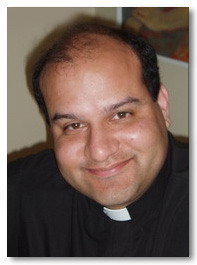Give it up
- FATHER RAYMOND J. DE SOUZA
We are two weeks into Lent and for those who observe the Christian practice of making a Lenten sacrifice, it's about now that the novelty of the challenge gives way to the onerous realization that Easter is still a month away.
 |
Fr. Raymond de Souza |
The practice of "giving something up" for Lent has its roots in a time when the gravity of sin was rather more recognized. Consequently, the requisite penances were more grave too. During Lent, public penitents (those guilty of notorious and scandalous sins) were required to do public acts of penance: no bathing, shaving, wearing shoes, sleeping on comfortable mattresses, etc. Beginning these public penances on Ash Wednesday, they would prepare themselves for absolution and a return to the sacraments on Holy Thursday. Over time, the 40 days of Lent were established as a time when all Christians would prepare for Good Friday and Easter Sunday by doing penance for sins in the past, and disciplining the appetites so as to avoid sins in the future.
Such penitential thinking about sin and reparation, discipline and temptation, is considered embarrassingly retrograde by promoters of Christianity-lite, but nevertheless the penitential spirit is quite widespread in our culture. It is tied not so much to the good of the soul in view of the next world, but to the good of the body in this world. The great Catholic theologian Michael Novak once told me that if Catholic priests were to assign jogging as a penance in the confessional, it would be denounced as a barbaric from of torture. (For the record, not even the most anti-Catholic historians of the inquisition ever accused it of making people jog.)
The penance-as-self-improvement theme is rather wittily treated in a new book by Mary Carlomagno called Give It Up! My Year of Living Better with Less. Carlomagno was living the life of a young Manhattan professional, always connected, always on the go, and always shopping. This last provoked a crisis. She was in her closet when "an avalanche of designer shoe boxes hit me squarely in the head." This brought her to her senses, as it were, and she began to question the hyper, but superficial, life she was leading. Too many soles; not enough soul.
"Would it be possible to live without a hundred boxes of designer shoes, costly microbrewed coffee, expensive handbags, or the ever-present cell phone that fueled my everyday existence?" she asked herself. That list may seem rather alien to a suburban family not in the New York City fast lane, but everyone would have one list or other. Think video games instead of shoes, and a typical teenage boy can relate.
Remembering the Lenten practices of her Catholic youth, Carlomagno decided to give something up every month for a year. In January, it was alcohol. In February, shopping. And then elevators, newspapers, cell phones, dining out, television, taxis, coffee, cursing, chocolate, multitasking. I demur from recommending sacrificing newspapers, but the rest is a pretty good list, with cursing being a commendable permanent sacrifice.
Carlomagno is no deep thinker, and there is no spiritual wisdom here, but she does come to realize some important lessons, principally that her "attitude toward needs and wants has changed. There is a distinction."
Lenten devotions and sacrifices remind us that so much of what clutters up contemporary life is just that: clutter. We can do with so much less than we think we need, and in the space left by the clutter we rediscover again the joy of reading a book, cooking a meal for others, serious conversations not fueled by alcohol, going for a walk or drive without trying to rearrange the day's schedule by mobile phone. Cutting down on the television alone would leave most families ample time to rediscover each other, and probably most of their neighbours too.
Lent is not supposed to be spiritual athletics, a time to discipline ourselves for the sake of becoming more efficient or healthy. The spiritual purpose is to reduce the clang and clamor of daily life so that the still, small voice of God can be heard in the gentle breeze, as the prophet Elijah discovered.
It is for that reason that many Christians actually find Lent more spiritually fruitful than Easter, paradoxical as that is. We don't say it, but perhaps we should: Happy Lent!
 This is J. Fraser Field, Founder of CERC. I hope you appreciated this piece. We curate these articles especially for believers like you.
This is J. Fraser Field, Founder of CERC. I hope you appreciated this piece. We curate these articles especially for believers like you.
Please show your appreciation by making a $3 donation. CERC is entirely reader supported.

Acknowledgement
Father Raymond J. de Souza, "Give it up." National Post, (Canada) March 16, 2006.
Reprinted with permission of the National Post and Fr. de Souza.
The Author
Father Raymond J. de Souza is the founding editor of Convivium magazine.
Copyright © 2006 National Post

